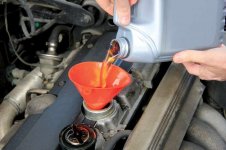So, I was scanning through my news feed this morning and came across this article by Alex Steele of Truck Trend regarding excessive oil consumption on modern engines. For those of you who aren't familiar with the problem, you might find it to be a good read.
Shop Class: Exploring The Causes of Excessive Oil Consumption
Alex Steele, Truck Trend Editors

It’s not just the mega-mileage ’75 F-100 blowing blue smoke out the tailpipe any more. Over the past decade a large number of low-mileage, late-model car and truck engines have been consuming excessive amounts of motor oil. The mechanical failures vary, but the root cause seems to be each manufacturer’s hurry-up need to meet EPA fuel economy and emissions requirements.
Yes, every four-stroke engine does normally burn a small amount of oil.
Before we get into the technical aspects of oil consumption, let’s look at how much is too much. Most manufacturers publish what we consider “cover-your-butt” specifications – commonly one quart burned every 1,000 miles being the normal threshold. Now let’s think about this. With recommended oil change intervals increasing from the old-faithful 3,000 miles and getting closer to 7,000, you could be adding 6 or 7 quarts of oil between services. Say your engine has a 5-quart oil capacity, you’re now buying up to 12 quarts per service, and all that extra oil is burned up and discharged into the atmosphere. Not to mention the carbon buildup in the combustion chamber and back of valves, rendering further harm to the engine’s performance and lifespan.
These oil consumption specs seem ridiculous, and thankfully most, but not all, manufacturers and dealership service departments will perform a repair before oil consumption reaches that degree.
Typical entry points of oil into the combustion chamber are past the piston rings and valve guides. Each piston utilizes rings, which are spring-loaded against the cylinder wall. These piston rings seal the high pressure in the combustion chamber, from the motor oil flying around inside the crankcase.
Click on the link below to read the whole article.
http://www.msn.com/en-us/autos/owne...consumption/ar-BBrL3Jx?ocid=spartanntp#page=1


